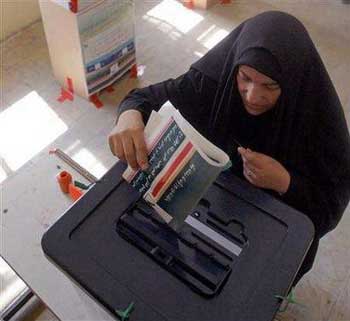|
Blackout, attacks mar eve of Iraq vote
(Agencies)
Updated: 2005-10-15 10:31 The frequent power outages that hit Baghdad and other parts of Iraq are a
constant cause of complaint by Iraqis. Friday night's blackout, however, hit a
larger area than most.
|

An Iraqi woman casts her ballot during a
rehersal vote, one day before the constitutional referendum at a polling
station in the southern Iraq city of Basra October 14, 2005.
[Reuters]
|
The attacks on the political party came as Sunni and Shiite clerics gave
their last advice to their followers in sermons during weekly Friday prayers — a
key political platform. Shiite imams transmitted the word of the majority
community's most powerful cleric, Grand Ayatollah Ali al-Sistani: Go to the
polls and vote "yes."
The message among the Sunni Arab minority was more muddled after the Iraqi
Islamic Party threw its support to the constitution after last minutes
amendments were made to the draft in an attempt to assuage Sunni objections
ahead of Saturday's referendum.
In Tikrit, Saddam Hussein's hometown north of Baghdad, the preacher at the
main mosque denounced the Islamic Party, saying it "broke the nationalist ranks
in return for nothing."
Sheik Rasheed Yousif al-Khishman told worshippers at Tikrit's al-Raheem
mosque to vote against the "infidel constitution written by foreign hands."
Mosques throughout the town told people to cast "no" votes and warned "anyone
who does not go to the polls is not considered a Sunni."
But in the nearby town of Samarra, Sheik Adil Mahmoud, of the Association of
Muslims Scholars, was more tempered in his sermon. "I will go to the polls and
vote 'no', but I leave the choice to you to follow you political references," he
told worshippers. "I respect the opinion of the Iraqi Islamic party and any
other party."
In Baghdad's biggest Sunni neighborhood, Azamiyah, several hundred
demonstrators marched toward the district's biggest mosque, Abu Hanifa — a
center for the Iraqi Islamic Party — touting banners proclaiming "No to the
Constitution" and chanting slogans describing the party's chief, Mohsen
Abdul-Hamid, as "a traitor."
Before dawn, someone threw a grenade at the house of the main cleric of the
Abu Hanifa Mosque, pro-Islamic Party Sheik Muayad al-Azami, but no one was hurt
in the explosion. The night before, his son was threatened by Sunni opponents
during prayers, al-Azami said.
In four other attacks, Islamic Party offices were damaged by roadside bombs
in Baghdad and the northern towns of Beiji and Seniyah, and by an arson attack
in Fallujah, police said. No injuries were reported. Fallujah is the city west
of Baghdad that was heavily damaged by a U.S. offensive against insurgents in
2004.
Before Friday, Sunni insurgents had rarely targeted a Sunni political party.
It "was expected because of (the party's) new stand toward the referendum,"
Iraqi army Maj. Salman Abdul Yahid said after the Baghdad blast. "Insurgents had
threatened to attack the group and its leaders to get revenge," he told The
Associated Press.
Alaa Makki, a senior party official in Baghdad, condemned the attack in the
capital and said it won't stop the moderate group's efforts to "use the
political process to fight terrorism and promote stability in Iraq."
|